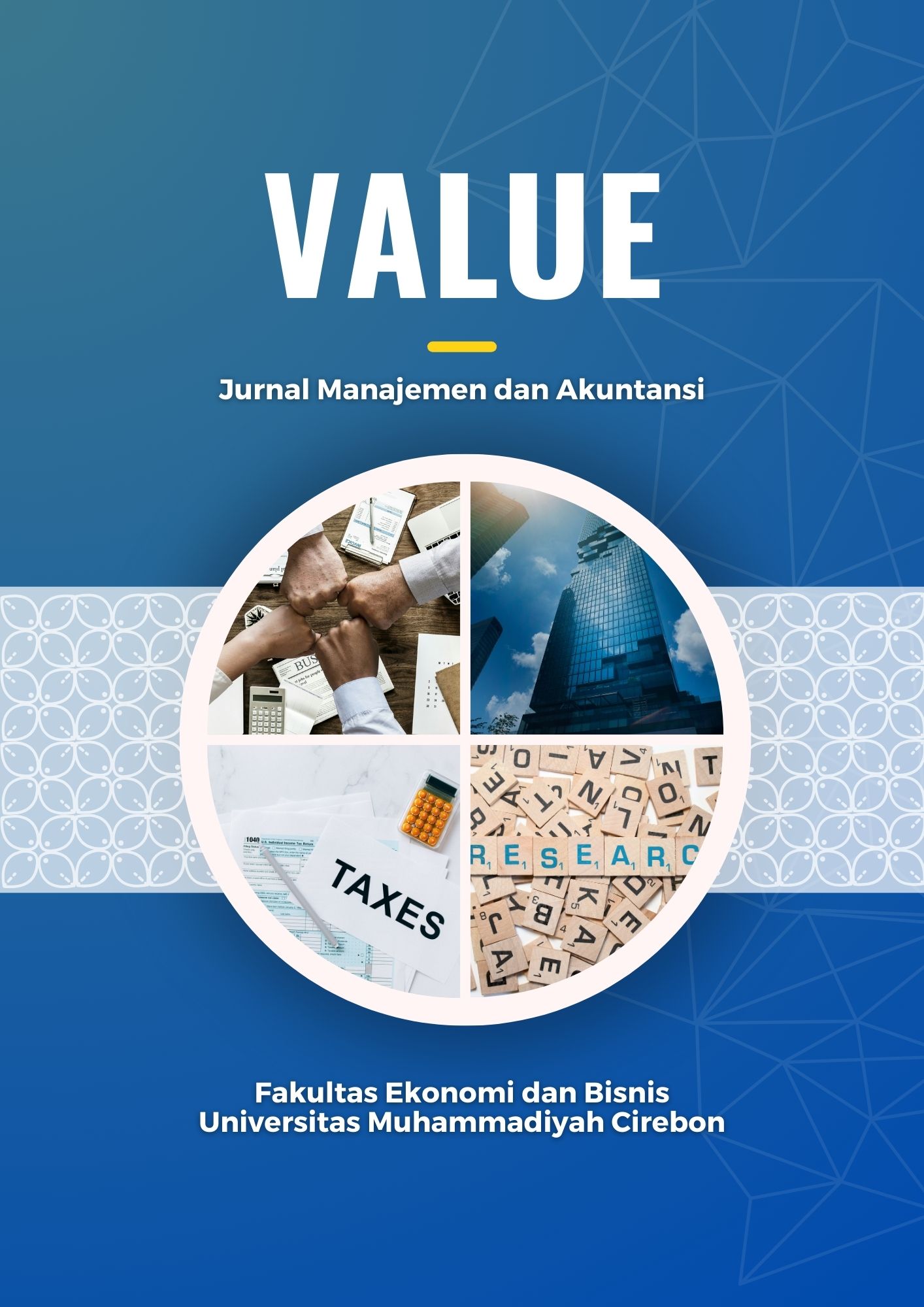Financial Attitude dan Financial Well-Being: Peran Mediasi Financial Behavior
DOI:
https://doi.org/10.32534/jv.v20i1.6903Keywords:
Financial Attitude, Financial Well-being, Financial Behavior, Financial Management, Bank Syariah IndonesiaAbstract
Financial behavior arises from a responsible financial attitude in both individual and family financial management so as to improve financial well-being. This study aims to determine the effect of financial attitude on financial well-being with the mediating role of financial behavior. The object of this research is 60 employees at the main branch office of Bank Syariah Indonesia in Yogyakarta. The sampling in this study used a purposive sampling technique using several criteria. The data collection method used a questionnaire. The data analysis tool used Smart PLS 4.0 software. The results of the instrument scale test used in this study were validity and reliability tests. Testing of the hypothesis shows that financial attitude has a positive effect on financial well-being, financial attitude has a positive effect on financial behavior, financial behavior has a positive effect on financial well-being, and financial behavior mediates the positive effect of financial attitude on financial well-being.
References
Aditya, D., & Azmansyah. (2021). Pengaruh financial knowledge, financial attitude, dan income terhadap financial behavior pada usaha mikro kecil dan menengah di Kecamatan Marpoyan Damai Pekanbaru. Jurnal Ekonomi KIAT, 32(2). https://doi.org/10.25299/kiat.2021.vol32(2).8564
Ahmad, A. (2021). Dampak locus of control, sikap keuangan, pendapatan, dan religiusitas terhadap perilaku keuangan. Management & Accounting Expose, 2(2). https://doi.org/10.36441/mae.v2i2.102
Ajzen, I. (1991) The theory of planned behavior. Organizational Behavior and Human Decision Processes, 50: 179-211
Ajzen, I. (2020). The theory of planned behavior: Frequently asked questions. Human Behavior and Emerging Technologies, 2(4). https://doi.org/10.1002/hbe2.195
Ajzen, I., & Fishbein, M., (1975), Belief, Attitude, Intention, and Behavior: An Introduction to Theory and Research, 129-385, Addison-Wesley, Reading, MA.
Akben-Selcuk, E. (2015). Factors influencing college students’ financial behaviors in Turkey: Evidence from a national survey. International Journal of Economics and Finance, 7(6), 87–94. https://doi.org/10.5539/ijef.v7n6p87
Anggraini, N. N. (2023). Pengaruh pendapatan dan perencanaan keuangan terhadap kesejahteraan keuangan dengan efikasi diri keuangan sebagai variabel intervening pada nasabah Bank Jateng kantor cabang koordinator Semarang. STIE Bank BPD Jateng.
Asandimitra, N. L. R. & N. (2018). Pengaruh demografi, financial knowledge, financial attitude, locus of control dan financial self-efficacy terhadap financial management behavior masyarakat surabaya. Jurnal Ilmu Manajemen, 6(2010).
Banthia, D., & Dey, S. K. (2022). Impact of Financial Knowledge, Financial Attitude and Financial Behaviour on Financial Literacy: Structural Equitation Modeling Approach. Universal Journal of Accounting and Finance, 10(1). https://doi.org/10.13189/UJAF.2022.100133
Bhushan, P., & Medury, Y. (2014). An Empirical Analysis of Inter-linkages between Financial Attitudes, Financial behaviour and Financial Knowledge of Salaried Individuals. Indian Journal of Commerce & Management Studies, 5(3).
Chong, K. F., Sabri, M. F., Magli, A. S., Rahim, H. A., Mokhtar, N., & Othman, M. A. (2021). The Effects of Financial Literacy, Self-Efficacy and Self-Coping on Financial Behavior of Emerging Adults. Journal of Asian Finance, Economics and Business, 8(3). https://doi.org/10.13106/jafeb.2021.vol8.no3.0905
Darmawan, D., & Pamungkas, A. S. (2019). Pengaruh Financial Attitude, Financial Behavior, Dan Financial Knowledge Terhadap Financial Satisfaction. Jurnal Manajerial Dan Kewirausahaan, 1(2). https://doi.org/10.24912/jmk.v1i2.5076
Davis, K., & Hustvedt, G. (2012). It’s a Matter of Control: Saving for Retirement. International Review of Social Sciences and Humanities, 3(2).
Dew, J., & Xiao, J. J. (2011). The financial management behavior scale: Development and validation. Journal of Financial Counseling and Planning, 22(1).
Garg, N., & Singh, S. (2018). Financial Literacy among Youth. International Journal of Social Economics.
Gathergood, J. (2012). Self-control, financial literacy and consumer over-indebtedness. Journal of Economic Psychology, 33(3). https://doi.org/10.1016/j.joep.2011.11.006
Ghozali, I. (2021). Partial Least Squares : Konsep, Teknik dan Aplikasi Menggunakan Program SmartPLS 3.2.9 untuk Penelitian Empiris. Semarang : Fakultas Ekonomika dan Bisnis Universitas Diponegoro.
Goud, M. M. (2022). A study on the saving and investment behaviour of individual investors. Journal of Commerce and Accounting Research, 11(1).
Gudmunson, C. G., & Danes, S. M. (2011). Family Financial Socialization: Theory and Critical Review. In Journal of Family and Economic Issues (Vol. 32, Issue 4). https://doi.org/10.1007/s10834-011-9275-y
Halim, Y. K. E., & Astuti, D. (2015). Financial Stressors, Financial Behavior, Risk Tolerance, Financial Solvency, Financial Knowledge, dan Kepuasan Finansial. Finesta, 3(1).
Hasibuan, B. K., Lubis, Y. M., & HR, W. A. (2018). Financial Literacy and Financial Behavior as a Measure of Financial Satisfaction. https://doi.org/10.2991/ebic-17.2018.79
Heny, A., Kusdyah, I., & Rahman, A. (2023). Pengaruh financial knowledge dan financial attitude terhadap financial well-being dengan financial management behavior sebagai variabel intervening pada anggota koperasi kredit di Kabupaten Sikka, Provinsi Nusa Tenggara Timur. Jurnal Ilmiah Riset Aplikasi Manajemen, 1(2). https://doi.org/10.32815/jiram.v1i2.24
Ilyas, M., Moeljadi, & Djawahir, A. H. (2021). The effect of financial knowledge and financial well-being on investment intention mediated by financial attitude: A study on millennial generation and Gen Z in Malang City. International Journal of Research in Business and Social Science (2147- 4478), 10(8).
Joshanloo, M., & Weijers, D. (2024). Ideal personhood through the ages: Tracing the genealogy of the modern concepts of wellbeing. Frontiers in Psychology, 15.
Jumady, E., Alam, S., Hasbiyadi, H., Fajriah, Y., & Anggraini, Y. (2024). The effect of financial planning on consumer debt management: The role of financial literacy, self-efficacy, and financial motivation. Atestasi: Jurnal Ilmiah Akuntansi, 7(1), 340–368.
Kentjana, N. M. P., & Nainggolan, P. (2018). Pengaruh reward dan punishment terhadap kinerja karyawan dengan motivasi sebagai variabel intervening (Studi Kasus Pada Pt. Bank Central Asia Tbk.). National Conference of Creative Industry. https://doi.org/10.30813/ncci.v0i0.1310
Kuknor, S., & Sharma, A. (2017). The relationship of debt management, compulsive buying behavior and financial well-being. Indian Journal of Public Health Research and Development, 8(4). https://doi.org/10.5958/0976-5506.2017.00436.3
Lantara, I. W. N., & Kartini, N. K. R. (2015). Akselerasi Program Edukasi Keuangan Melalui Kolaborasi Bank Indonesia, Lembaga Keuangan, Dan Perguruan Tinggi. Jurnal Riset Manajemen Sekolah Tinggi Ilmu Ekonomi Widya Wiwaha Program Magister Manajemen, 2(2). https://doi.org/10.32477/jrm.v2i2.171
Lestari, H. S. (2022). Faktor-faktor yang mempengaruhi financial well-being. Jurnal Ilmiah Manajemen Bisnis Dan Inovasi Universitas Sam Ratulangi, 9(3), 1577–1598.
Lusardi, A., & Mitchell, O. S. (2014). The economic importance of financial literacy: Theory and evidence. Journal of Economic Literature, 52(1). https://doi.org/10.1257/jel.52.1.5
Pankow, D. (2003). Financial Values, Attitudes and Goals. NDSU Extension Circular Extension Circular.
Parulian, P., & Tan, E. (2021). Peran Penyerapan Literasi Keuangan Terhadap Kesejahteraan Keuangan Generasi Milenial pada Masa Pandemi Covid-19. Jurnal Pengembangan Wiraswasta, 23(2). https://doi.org/10.33370/jpw.v23i2.508
Philippas, N. D., & Avdoulas, C. (2020). Financial literacy and financial well-being among generation-Z university students: Evidence from Greece. European Journal of Finance, 26(4–5). https://doi.org/10.1080/1351847X.2019.1701512
Potrich, A. C. G., Vieira, K. M., Coronel, D. A., & Bender Filho, R. (2015). Financial literacy in Southern Brazil: Modeling and invariance between genders. Journal of Behavioral and Experimental Finance, 6. https://doi.org/10.1016/j.jbef.2015.03.002
Prawitz, A. D., Garman, E. T., Sorhaindo, B., O’Neill, B., Kim, J., & Drentea, P. (2006). InCharge financial distress/financial well-being scale: Development, administration, and score interpretation. Journal of Financial Counseling and Planning, 17(1).
Prayogi, O. (2024). Peran kritis manajemen keuangan dalam meningkatkan kesejahteraan keluarga: Sebuah tinjauan literatur. Jurnal Manajemen Dan Bisnis, 2(3), 31–44.
Prihatni, R., Baroto, Y., Simbolon, H. O., Amalia, D., Meirsha, I. D. M. T., Azis, S. A., & Sastraatmadja, A. H. M. (2024). Analisis literasi keuangan dan inklusi keuangan di Indonesia: Strategi untuk meningkatkan kesejahteraan finansial masyarakat. Penerbit Widina.
Putri, R., & Siregar, Q. R. (2022). Pengaruh Pengetahuan Keuangan, Sikap Keuangan Dan Literasi Keuangan Terhadap Perilaku Manajemen Keuangan Pada Pelaku Umkm Ayam Penyet Di Desa Laut Dendang. JURNAL AKMAMI : Jurnal Akuntansi, Manajemen, Ekonomi, 3(3).
Ratnawati, Rokhman, M. T. N., Rochayatun, S., Meldona, & Rahayu, Y. N. (2023). Financial attitude and financial performance of export MSMEs: Financial well-being as a mediating. International Journal of Applied Economics, Finance and Accounting, 16(1). https://doi.org/10.33094/ijaefa.v16i1.901
Roscoe, J. T. (1975). Fundamental Research Statistics for The Behavioural Sciences (2nd Edition). Holt Rinehart & Winston.
Sabri, M. F., Anthony, M., Law, S. H., Rahim, H. A., Burhan, N. A. S., & Ithnin, M. (2024). Impact of financial behaviour on financial well-being: evidence among young adults in Malaysia. Journal of Financial Services Marketing, 29(3). https://doi.org/10.1057/s41264-023-00234-8
Samadiyah, N. R. F., Nersiwad, N., & Verlandes, Y. (2024). Pengaruh financial knowledge, financial attitude dan self control terhadap perilaku menabung siswa kelas XI SMAN 1 Wringinanom. MASMAN: Master Manajemen, 2(3), 150–163.
Setiawan, H. (2023). Determinan Kesejahteraan Keuangan Pada Karyawan Bank Jatim Dengan Perilaku Keuangan Sebagai Mediasi. Universitas Hayam Wuruk Perbanas Surabaya.
Setiyani, R., & Solichatun, I. (2019). Financial Well-being of College Students: An Empirical Study on Mediation Effect of Financial Behavior. KnE Social Sciences, 3(11). https://doi.org/10.18502/kss.v3i11.4026
She, L., Rasiah, R., Turner, J. J., Guptan, V., & Sharif Nia, H. (2022). Psychological beliefs and financial well-being among working adults: the mediating role of financial behaviour. International Journal of Social Economics, 49(2). https://doi.org/10.1108/IJSE-07-2021-0389
Shim, S., Barber, B. L., Card, N. A., Xiao, J. J., & Serido, J. (2010). Financial Socialization of First-year College Students: The Roles of Parents, Work, and Education. Journal of Youth and Adolescence, 39(12). https://doi.org/10.1007/s10964-009-9432-x
Sina, P. G. (2012). ANALISIS LITERASI EKONOMI. Jurnal Economia, 8(2).
Sorongan, F. A. (2022). The Influence of Behavior Financial and Financial Attitude on Investment Decisions With Financial Literature as Moderating Variable. European Journal of Business and Management Research, 7(1). https://doi.org/10.24018/ejbmr.2022.7.1.1291
Sumani, S., & Roziq, A. (2020). Financial Literation: Determinants of Financial Well-Being in the Batik Small and Medium Industries in East Java. Jurnal Aplikasi Manajemen, 18(2), 289–299.
Surahman, S., Sihabudin, S., & Fauji, R. (2024). Analisis Komparatif Tingkat Literasi Keuangan dan Prilaku Pengelolaan Keuangan pada Nasabah Bank Emok dan Bank BRI Unit Tanjung Jaya di Desa Sukaratu Kec. Cilebar Kab. Karawang. BUDGETING: Journal of Business, Management and Accounting, 5(2), 852–869.
Sutini, S., & Wiyanto, H. (2024). Faktor Penentu Kesejahteraan Finansial pada Generasi Muda di Jakarta. Jurnal Manajerial Dan Kewirausahaan, 6(2), 463–471.
Vishwakarma, P. (2024). Impact of Womens Financial Inclusion and Financial Attitude on their Financial Well-Being. Journal of Commerce and Accounting Research, 13(1). https://doi.org/10.21863/jcar/2024.13.1.001
Wahyuni, S. F., Radiman, R., Lestari, S. P., & Lestari, S. S. I. (2024). Keterkaitan antara Literasi Keuangan dan Pendapatan Pada Kesejahteraan Keuangan: Mediasi Prilaku Keuangan Generasi Sandwich. Bursa: Jurnal Ekonomi Dan Bisnis, 3(3), 30–43.
Weiss, M. G., & Bufe, S. (2019). Financial Shocks and Financial Well-Being: Which Factors Help Build Financial Resiliency in Lower-Income Households? Social Policy Institute. St ….
Xiao, J. J., Chen, C., & Chen, F. (2014). Consumer financial capability and financial satisfaction. Social Indicators Research, 118(1). https://doi.org/10.1007/s11205-013-0414-8
Xiao, J. J., & Porto, N. (2017). Financial education and financial satisfaction: Financial literacy, behavior, and capability as mediators. International Journal of Bank Marketing, 35(5). https://doi.org/10.1108/IJBM-01-2016-0009
Xiao, J. J., Tang, C., & Shim, S. (2009). Acting for happiness: Financial behavior and life satisfaction of college students. Social Indicators Research, 92(1). https://doi.org/10.1007/s11205-008-9288-6
Yoopetch, C., & Chaithanapat, P. (2021). The effect of financial attitude, financial behavior and subjective norm on stock investment intention. Kasetsart Journal of Social Sciences, 42(3). https://doi.org/10.34044/j.kjss.2021.42.3.08
Yushita, A. N. (2017). Pentingnya literasi keuangan bagi pengelolaan keuangan pribadi. Nominal, Barometer Riset Akuntansi Dan Manajemen, 6(1). https://doi.org/10.21831/nominal.v6i1.14330


















